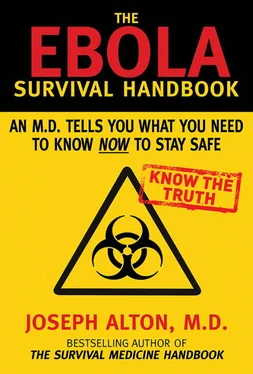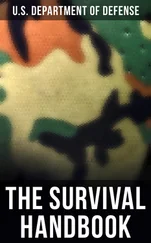At this point, you’ll take out those items for your sick room and get it equipped. When someone is sick with Ebola, they could easily collapse in your kitchen. You don’t want them in your common areas, but there they’ll stay until you have the sick room with the plastic sheeting up and running. If someone becomes ill, you can transport them straight to the sick room if you already have it set up.
Stock up.While the stores still have food, get enough to last you a good long while. Concentrate on nonperishables and stockpile water supplies. Get equipment that would allow you to make fires for cooking and disposing of hazardous waste. If your area gets quarantined, you might have to depend on what you have on hand.
Other helpful items to have on hand include:
• Firestarters, candles, matches, lighters
• Propane fuel for cooking
• Flashlight or other light source and batteries
• Hand-crank radio
• Axe and knife
• First aid kit
Hit the road, Jack.There may come a time when your healthy family is surrounded by victims of the epidemic. You might just have a vacation home in a remote area or a favorite camping spot that no one else knows about. This is a serious decision, but it may be an option in dire times.
While you can still get fuel, keep your vehicle’s gas tank filled to the top. You can get a good distance away if you have a place to go. Prepare “go bags” packed with changes of clothes, toiletries, and individually packaged nonperishable food and bottles of water in case evacuation becomes imminent.
If you’re heading for the woods, you’ll need a tent, sleeping bags, tarps, and other necessities for a reasonable shelter. Outdoor clothing and a good set of boots are a must, as well. A good compass is never a bad idea, as well as whistles for everyone in case you get separated.
NOW YOU KNOW…
Frequent hand washing is the best way to avoid getting sick from many infectious diseases, including Ebola. Keep your hands off your face to decrease the risk of disease. Planning a sick room will keep you prepared if an epidemic breaks out in your area. Social distancing is a strategy that will decrease your number of contacts and your chance of contracting contagious diseases. Having stockpiles of food, water, gas, and other items will keep you going if everything else fails. Tough decisions, such as whether to stay where you are or risk travel to other areas, are part and parcel of epidemic scenarios.
Suzanne Hamner wrote on Freedom Outpost that “our government failed to protect the citizenry from the outbreak of this dangerous, deadly, contagious [disease] by suspending air travel to and from suspected areas or securing our southern border. At a time when communities deserve truth instead of over-confidence, our government has insured over-confidence is to be the face of the health-care community.”
Indeed, we have been told so often that “all is well” that the average person has become either oblivious or extremely suspicious that all is not well.
While a work of fiction, Stephen King’s The Stand showed all too well how one careless act involving infectious material can lead to a nearly worldwide annihilation of humanity. The Stand is one of my favorite books from years before I ever became interested in medical preparedness. Clearly, the Ebola virus is a perfect analogy for the “Superflu” described in the book. It’s deadly, it’s contagious, and it can turn society on its ear if not contained.
EBOLA AS A BIOLOGICAL WEAPON
Given my fondness for Stephen King’s The Stand , you would think that I would be a big conspiracy theorist or someone who strongly suspects that Ebola has been unleashed purposefully on an unknowing and ill-prepared world. I’m not. That doesn’t mean I would be surprised if Ebola virus samples turned up in some country’s secret laboratory, but it does mean that I can critically evaluate whether it is really that amenable to weaponization.
As I discuss on my website, biological warfare is the use of infectious agents such as bacteria, viruses, fungi, or their by-products to wreak death and havoc among a specific population. The user’s goal is to achieve control over an area or a segment of the population by weakening the ability to resist. Biological weapons don’t necessarily have to kill directly: unleashing a horde of locusts to destroy crops or agents that kill an area’s livestock can be just as effective.
The perfect biological weapon would have these characteristics:
• Be infectious and contagious in a large percentage of those exposed
• Cause severe long-term debilitation or death of the infected organism
• Have few available antidotes, preventives, or cures
• Be easily deliverable to the area or population targeted
• Have low likelihood of causing damage to those using the agent
From my research, Ebola virus doesn’t make the grade. Ebola virus is very sensitive to its environment and just doesn’t last long outside a host. It doesn’t tolerate sunlight and needs high temperature and humidity to survive. Most cities in developed countries don’t have the climate conducive to Ebola’s survival.
Viruses live in hosts, and with commercial air travel, I would guess that it’s possible that an Ebola patient in Texas or Florida could travel with the virus to North Dakota or Minnesota. The fact is, however, that no epidemic outbreak of Ebola has ever spontaneously occurred outside of a hot, humid region.
TIP
Most cities in developed countries don’t have the climate conducive to Ebola’s survival.
Ebola is also not easy to work with. Even if a terrorist kidnapped an Ebola victim to get viral samples, working with the virus in anything less than an advanced microbiology lab (called a “Biosafety Level 4”) would likely result in the terrorist dying from the disease. As well, Ebola virus is too sensitive to survive the complex process of refining, enriching, and so on that is necessary for weaponization.
So don’t panic the next time you read about “Ebola Gas” or “Ebola Bombs.” Be aware of the virus, have supplies available that will help in a crisis, and use your most important survival tool: your mind. Do your research and get the facts to come to a conclusion.
THE BOTTOM LINE
Government and health officials will continue to downplay the notion that Ebola could reach apocalyptic proportions to avoid wholesale panic, even if four thousand American military personnel are deployed to the epidemic zone. To be prepared, however, it’s important to always stay aware of the facts and never assume that it couldn’t happen here.
Americans need to prepare by making a plan of action that can be activated if Ebola ever reaches their area. They must also continue asking the tough questions of those in power. The American Thinker blog offers fourteen questions that will never be asked about Ebola but should be. They include:
• “Why doesn’t the United States have a mandatory quarantine period of twenty-eight days before allowing any traveler who has visited West Africa in the past ninety days, to enter our country?”
• “If an outbreak of Ebola occurs in a major US city such as New York, Chicago, or Los Angeles, is this government prepared to quarantine five to eight million citizens from land, sea, and air travel to stop the spread of the virus? How many deaths from such an outbreak would trigger such quarantine? Would US troops be ordered to fire upon US citizens attempting to evade the quarantine?”
• “How many Ebola deaths nationally would trigger a Presidential Executive Order declaring martial law, nationalizing the distribution of food, energy, health care, and information? Would this Executive Order also limit the duration of martial law and the circumstances for it being lifted?”
Читать дальше



![John Stieber - Against the Odds - Survival on the Russian Front 1944-1945 [2nd Edition]](/books/405234/john-stieber-against-the-odds-survival-on-the-russian-front-1944-1945-2nd-edition-thumb.webp)








